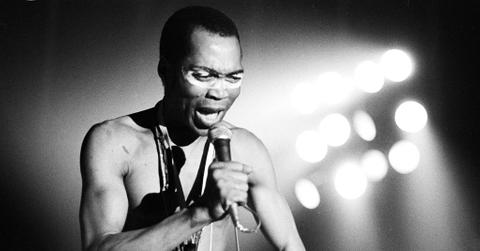
The Rise of Afrobeat: From Fela Kuti to Burna Boy
Discover the evolution of Afrobeat music, its rise from Fela Kuti's radical roots to contemporary stars like Burna Boy shaping global pop culture. Explore the genre's journey.
By Micah DecuireFeb. 9 2024, Published 8:45 p.m. ET
In the late 1960s, Nigerian multi-instrumentalist and bandleader Fela Kuti began fusing funk and jazz with traditional Yoruba and highlife influences to create a bold new sound he dubbed “Afrobeat”.
Characterized by dynamic polyrhythms, distinctive horns, call-and-response vocals, and expansive groove-centered compositions, Fela's musical style became synonymous with his artistic identity. He skillfully wove lyrics in a blend of pidgin English, Yoruba, and political rhetoric, using his music to boldly confront governmental corruption and oppression. According to Muhutu-Remy a committed pan-Africanist, "The African diaspora and the desire to connect with some part of home has played a part in how this genre has spread, but its popularity also has a lot to do with its feel-good nature."
Despite enduring hundreds of arrests, brutal beatings, and even home burnings at the hands of authorities, Fela defiantly maintained his bold stance. His audacious lyrics and impassioned stage presence solidified his status as an icon. In 1978, Amnesty International recognized him as the first-named prisoner of conscience, amplifying global awareness of the human rights abuses perpetrated by the Nigerian regime.
Fela’s outlaw image, confrontational Afrobeat sound and mystic persona as a spiritual and political resistance leader cast “The Black President '' as both musician and prophet, sowing Afrobeat’s seeds worldwide.
Golden Era Dawns
In the ‘80s and ‘90s, Fela’s sons Femi and Seun carried Afrobeat’s torch while incorporating more contemporary sounds. British-Nigerian Tony Allen, Fela’s drummer and co-creator, became an influential force, blending Afrobeat with electronica. Fela's consistent international touring spread Afrobeat globally, allowing the scene to evolve through second-generation stars.
As Nigeria transitioned from dictatorship to democracy in 1999, Lagos exploded into cultural hub status. A burgeoning hip-hop and emerging R&B/pop scene fused traditional sounds with renewed stylistic freedom, setting the stage for Afrobeat’s 21st-century explosion.
Sonics Expand & Unify
In the mid-2000s, Nigeria birthed diverse new stars like D’Banj, 2Face Idibia, and P-Square, who Afrobeatized hip hop and R&B as “Afro hip hop” and “Afro pop”, captivating youth. Ghanaian hiplife and Azonto beats mixed hip hop with highlife and dance, spreading West African influence globally, while Congolese soukous and South African house, kwaito, and mbaqanga garnered devotees.
As sound system culture and pirate radio took urban African music globally via the internet and migrants, DJs & producers in Europe’s diaspora communities created dynamic spaces bridging African and Western sonics. Gradually the expansive “Afrobeats" emerged as a cultural identifier and musical movement, unifying diverse contemporary rhythms rooted in pan-Africanism.
From Lagos to London
As of 2010, Afrobeats had firmly established itself as a formidable musical genre, marked by a dynamic fusion of Afro-pop, R&B, rap, grime, and more, thanks to the collaborative efforts of Nigerian, Ghanaian, and British-African hybrid stars. This eclectic blend created a fluid musical landscape where influences seamlessly interchanged. The global ascent of Afrobeats was facilitated by influential UK labels, leveraging digital platforms and thriving multiculturalism within London's underground scene.
The genre's infectious rhythms gained further momentum with the introduction of energetic dance moves like Alanta's Azonto, South Africa's Gwara Gwara, and Nigeria's Shaku Shaku. These dance styles not only became popular in their respective regions but also contributed to the spread of Afrobeats rhythms through viral street dance clips.
The propulsive beats and signature triplet patterns transcended urban radio, permeating global pop culture and solidifying Afrobeats as a dynamic and influential force in the music landscape.
The Afrowave
Increased internet access and streaming saw Africa develop world-conquering ‘Afro-fusion’ hybrids through genre-blending young superstars. Nigeria birthed alté scene figureheads like Burna Boy, Wizkid, Davido, Tiwa Savage, and Mr Eazi, often collaborating with chart-topping Westerners.
Vibrant pan-African pop evolutions like Tanzania’s ‘Bongo Flava’ found global fans. Ghana and South Africa also produced distinctive Afro-fusions, often with political undercurrents.
The 2010s saw Afrobeats graduate from an African/diaspora underground phenomenon to a full-fledged youth culture. By mid-decade, dancehall, R&B, hip hop, and electronic stars were incorporating Afrobeats, as Western charts continually embraced African talent.
Mainstream Momentum
Burna Boy’s Grammy-winning Twice as Tall in 2020 cemented Afrobeats as a hip hop/R&B mainstay while electronic pop continues to co-opt the sound. Already a cultural force across Africa and its far-flung diasporas, Afrobeats now sits poised for global pop music dominance, with potent 21st-century hip hop and R&B hybridity at its core invoking Fela’s spirit of resistance.
Having organically blossomed across Africa and its migrant communities, Afrobeats’ multifaceted vibrancy infects worldwide airwaves more each year. The revolution Fela Kuti sparked musically and politically burns brightly onwards.

